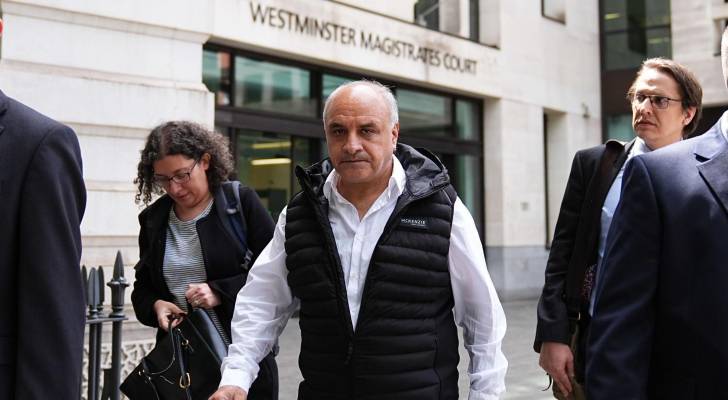Hamit Coskun (Credit: PA Media)
Man convicted for Quran burning outside Turkish consulate in London
A 50-year-old man has been convicted of a religiously aggravated offence after burning a copy of the Quran in front of the Turkish consulate in London earlier this year.
Hamit Coskun, who traveled from Derby to Knightsbridge, set fire to the Islamic holy book while making offensive remarks about Islam on February 13. The act, which took place outside the consulate on Rutland Gardens, was deemed both inflammatory and hostile by Westminster Magistrates Court.
District Judge John McGarva found Coskun guilty of a religiously aggravated public order offence as well as disorderly behaviour, handing down a 240 pound (USD 324) fine and imposing an additional statutory surcharge of 96 pounds (USD 130).
In court, Judge McGarva criticized the nature of Coskun’s actions, describing them as “provocative and taunting,” and stated, “You have a deep-seated hatred of Islam and its followers.”
The judge said Coskun’s motivations were rooted in personal and familial experiences in Turkey, adding, “It's not possible to separate your views about the religion from your views about the followers.” He further noted, “Your actions in burning the Quran where you did were highly provocative, and your actions were accompanied by bad language… motivated at least in part by hatred of followers of the religion.”
Coskun, who is of Kurdish and Armenian descent, had argued that his protest was aimed solely at the Turkish government, particularly President Recep Tayyip Erdogan, whom he accused of turning Turkey into a haven for "radical Islamists". Prosecutors cited social media posts where Coskun denounced Erdogan’s government and voiced concern about alleged moves toward establishing a “Sharia regime.”
Following his conviction, Coskun issued a statement calling the ruling “an assault on free speech” and warning that it could discourage others from exercising their rights to protest. His legal defense has received backing from both the National Secular Society and the Free Speech Union (FSU), who have vowed to challenge the verdict through every legal channel.
An FSU spokesperson said the organization is prepared to take the case to the European Court of Human Rights if necessary, arguing, “Religious tolerance is an important British value, but it doesn't require non-believers to respect the blasphemy codes of believers.”
The case has also drawn attention from political figures. Equalities Minister and Conservative MP Kemi Badenoch took to X, stating, “De facto blasphemy laws will set this country on the road to ruin. Freedom of belief, and freedom not to believe, are inalienable rights in Britain.”
While a spokesperson for the prime minister refrained from commenting on the specific case, they reaffirmed that “there are no blasphemy laws and no plans to introduce any.”
Judge McGarva emphasized in his ruling that the conviction was not an attempt to revive blasphemy laws, which were officially abolished in 2008. He acknowledged that burning a religious book is not inherently unlawful but said the combination of Islamophobic remarks and inflammatory conduct rendered Coskun’s actions criminal in this instance.
Humanists UK also weighed in, expressing concern about the legal threshold for such prosecutions. A spokesperson stated, “We must make sure that public order legislation is not used to disproportionately target speech – even offensive speech – on religious matters, thereby chilling legitimate criticism and expression.”




